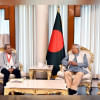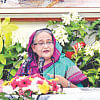Political tensions near a boiling point?

On June 12, Barishal city mayoral candidate Syed Faizul Karim came under attack by ruling party men. Chief Election Commissioner Kazi Habibul Awal dismissed the wave of questions levelled at his office saying, "He did not die, did he?" The CEC said he "didn't see him bleeding," as if death or bloodshed are the only determinants of violence in elections. Soon after his comments, Awal faced severe criticism and it took around 14 days for him to publicly regret his remarks, with an additional allegation that the media had distorted his words.
More than a month later, on July 17, Dhaka-17 by-election independent candidate Ashraful Hossain, better known as Hero Alom, was physically assaulted and forced to leave a polling centre in Banani that he had gone to inspect. This time, the EC demanded that authorities form a judicial inquiry committee to investigate the attack. This also means that the EC will not take any actions by itself, but will limit itself to writing to the authorities concerned. To make the optics even worse, the attack on Hero Alom took place while a European Union exploratory team was visiting Dhaka and holding talks with various stakeholders to assess the electoral atmosphere.
The July 17 attack created a huge buzz in the political and international arenas. Opposition parties queried that if the ruling party could not tolerate candidates like Hero Alom, how would it hold a free and fair election? The missions of 13 countries, including the US, UK, and the EU, expressed concern over the incident. Law enforcers acted promptly, arresting some of Hero Alom's "attackers."
The two instances above provide somewhat of an indication as to how the Election Commission will be handling voting in the 300 constituencies. It has already demonstrated its toothlessness and unquestioning subservience. The state of a single grain can tell one whether all the rice in a pot has cooked or not.
It is in this context that the EC has agreed to register two new political parties – on paper, at least. One is called Bangladesh Nationalist Movement (BNM) and the other is Bangladesh Supreme Party (BSP). The similarity between the parties' names is perhaps no coincidence; it is a ploy (a rather simplistic one) targeting the main opposition camp to break it up into factions. The EC has naturally come under interrogation after allowing the registration of these two small and unknown parties while dropping many active ones. A recent analysis by Prothom Alo also questioned whether this quasi-judicial body that is expected to be independent and autonomous could actually be running as per the government's suggestions. What it boils down to is this: if the Commission cannot overrule the simple pressure of registering two paper-based parties who have little or no activity, how would it resist more serious pressures from the ruling party during the election?
One could say that Awami League has lost its last chance to show people that it is at least considering free and fair elections, or that the EC will be impartial – that there is at least a sliver of a chance that the upcoming national election will not be another landslide for the ruling party.
The crisis does not end here. If we look at the election itself, the picture is rather alarming. In the by-polls, the ruling party candidate got only around nine percent of the votes and won the seat to represent Bangladesh's most upscale neighbourhood with a total voter turnout of 12 percent. There is no legal irregularity here, but the win was hardly accorded to the victor with any satisfaction. It certainly begs the question, where have all the voters gone? Sure, by-elections typically see low voter interest since most consider them a "done deal," a feeling that seems to have pervaded people's perception of elections for the last many years. Still, citing the example of Dhaka-10 in 2020 (when only 5.28 percent voters had shown up), the EC could perhaps get away with saying that it has done better than previous by-polls.
But the instances of the Dhaka-10 and Dhaka-17 by-polls make one wonder about Awami League's staunch voter base, which is around 35-40 percent. If the last election is to be considered a benchmark, then it consists of well over 75 percent of the electorate. The pathetic voter turnout of late would then indicate that either the Awami League is fielding candidates who do not appeal to its own core base of supporters, or that even the party faithfuls have lost interest in the election process and prefer to stay home.
This politics-loving, election-crazy nation's growing frustration probably originated in 2014, when 153 lawmakers were elected uncontested. Since then, the electoral system has been falling apart and people have been losing interest in it. The situation is now at such a level that people feel that whoever is nominated from the ruling party will win, with or without their votes.
One could say that Awami League has lost its last chance to show people that it is at least considering free and fair elections, or that the EC will be impartial – that there is at least a sliver of a chance that the upcoming national election will not be another landslide for the ruling party. The Election Commission's stance, the ruling party activists assaulting a candidate they simply did not approve of, the main opposition camp threatening to boycott the election if the government does not step down, and the ruling government being adamant on overseeing the election ("according to the Constitution," it keeps harping on) are all slowly, but worryingly, pushing the political mercury up. Will it reach the boiling point?
Mohammad Al-Masum Molla is chief reporter at The Daily Star.

 For all latest news, follow The Daily Star's Google News channel.
For all latest news, follow The Daily Star's Google News channel. 










Comments